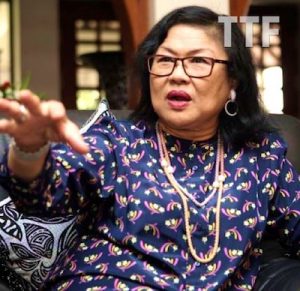“Rafidah is rumoured to have insisted that Najib be ousted due to her deep-rooted hatred for Rosmah” – Raggie Jessy
TTF: Deputy international trade and industry minister Dr Ong Kian Ming said today that the government has no plans to abolish the AP as it was not a factor in determining vehicle prices in the market (see news item below).
However, what he didn’t tell you was that the administration of Dato’ Seri Najib Tun Razak had planned to pull the brakes on the franchise AP system, a remnant of the system Mahathir introduced back in 1983 that was abused and led to the skyrocketing of car prices.
Ong also failed to inform you that the person who felt the pinch most was Tan Sri Rafidah Aziz, better known as the “AP Queen” among ministerial circles that seemed to think she made billions from the “illegal trade of APs.”
On the 10th of March 2018, I wrote (in red):
On the 28th of October 2009, the Ministry of International Trade and Industry (MITI) announced revisions to the National Automotive Policy (NAP) with the stated intent of invigorating the automotive sector. The newly minted administration of Dato’ Seri Najib Tun Razak was determined to liberalise the national economy by doing away with the crony-centric safeguards Dr Mahathir Mohamad introduced back in the eighties.
Najib knew that the safeguards Mahathir introduced were loopholes through which the former premier’s cronies were benefitting illegally from. It is for this reason, above all, that the Prime Minister committed to phasing out the Approved Permit (AP) system that the Government of Malaysia (GoM) introduced back in 1983. But he wasn’t rash about the whole affair.
On the contrary, he agreed to extend the system for 10 years with hopes that the Bumiputera segment would get its act together before the protectionist barrier was demolished. Najib knew that the demolition of the barrier would trigger a considerable drop in showroom prices as more and more players partook in the import of cars. On the whole, the reforms held the promise of safeguarding consumer interests while presenting manufacturers with the opportunity for expansion and growth.
But not everyone was pleased.
One of those who probably foamed in the mouth was Tan Sri Rafidah Aziz, the former Minister of International Trade and Industry. Having led the ministry for 21 years, this lady was given a free hand to push the yes and no buttons in ways that benefitted the staunchest of her proponents in more ways than one. What bothered ministry insiders most was the lackadaisical attitude she displayed when it was brought to her attention that AP holders were trading permits under the counter in cash terms and through the solicitation of business favours.
And we’re talking 156 out of 254 companies that, throughout her tenure, lost their permits due to abuse in the system. The abuse added thousands upon thousands of dollars – not ringgits – to the retail cost of imported cars, meaning, Malaysians were paying a helluva lot of money for the average Mercedes and Volvo due to the exorbitant rates with which APs were being sold.
Needless to say, someone somewhere chalked up millions upon millions a year through ‘commissions’ he (or she) was not supposed to earn. Now, chuck all of this information into the truth cauldron, and throw a pinch or two of some common sense – can you already smell the fish curry simmering?
On the one hand, Rafidah wants you to believe that Najib is lax in matters of enforcement where it concerns billionaire Low Taek Jho (Jho Low). On the other hand, she led a ministry that pumped thousands upon thousands of dollars into the already inflated costs of imported cars by turning a blind eye to abuses in the AP system. Yet, not once has she established the need for the GoM to concern itself with Jho Low, let alone the yacht he may have owned or the underwear he wears.
But I can tell you with a hundred percent certainty that she is among the reasons Malaysians were made to pay exorbitant prices for imported cars between the years 1987 and 2008, prices that were leaps and bounds higher than what they should have been. Question is, did she allow all this to happen for free, or are the AP holders greasing her palms to this day?
For the sake of discussion, let’s go with the latter – let’s assume that she’s making millions a year in commissions from the import of luxury cars. Under the circumstances, is it not obvious that the money her cronies are paying her is going to run out this coming 31st of December 2020?
If you’re wondering why, that is the day Najib will pull the brakes on the franchise AP system, a remnant of the system Mahathir introduced in 1983. Rafidah may already have felt the pinch back on the 31st of December 2015 when the open AP system was abolished. A set of documents that surfaced in 2005 revealed that she turned the system into a “lucrative middle-man cash cow operation” by granting APs to four of her cronies. The “AP Kings”went on to earn billions of dollars by selling the permits at ridiculously inflated prices and some billions more by using their own APs to import luxury cars.
Can Dr Ong Kian Ming comment on this?
Can he and the Government of Malaysia (GoM) call for an RCI into Rafidah’s role in the yet to be investigated “AP King” scandal in the spirit of Competency, Accountability and Transparency (CAT)?
Most importantly, is the GoM willing to freeze Rafidah’s accounts to get to the bottom of the conspiracy?
The government says it will announce the National Automotive Policy (NAP) review by the end of the year, and the revised policy will ensure that the automotive industry remains competitive whilst benefitting the rakyat, Bernama reports. It will also set out to dismantle monopolies, according to deputy international trade and industry minister Dr Ong Kian Ming.
“We are reviewing the NAP and we will announce a new, more competitive policy that offers more reasonable prices for vehicles. We are also looking again at the RM10,000 fees that vehicle traders have to pay for every open Approved Permit (AP) import licence,” he told the Dewan Negara.
Ong was replying to a supplementary question from senator Datuk Chai Kim Sen on the AP fees imposed on vehicle traders, and said that the new policy will place an importance on the revamp of all monopolies in the industry.
Replying to the original question from Chai, who wanted to know whether the government planned to abolish the AP in fulfilling a Pakatan Harapan promise to reduce vehicle prices, Ong said the government had no plan to abolish the AP as it was not a factor in determining vehicle prices in the market.
He did however say that aspects of the subject would be looked into, including the exploitation of APs. “We will also adopt several stringent measures to ensure that the AP is not misused,” he said.
Source: Paultan




